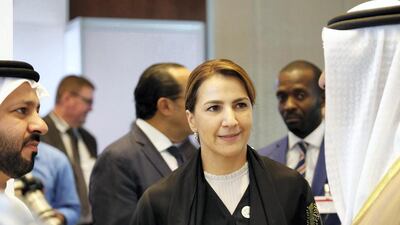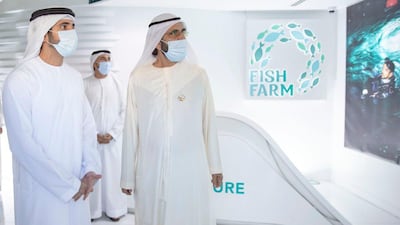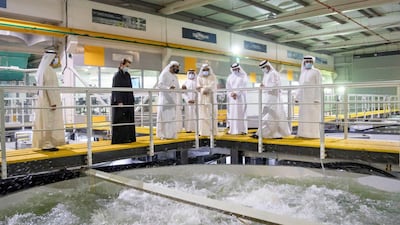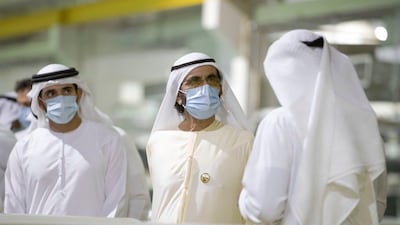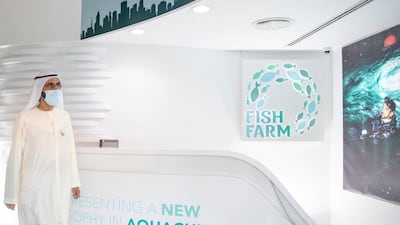Technological investments in aquaculture are critical for national food security, the Minister of State for Food Security said on Wednesday.
Mariam Al Mheiri said the closure of international borders and interruption of food supply chains due to Covid-19 highlighted the importance of developing the sector.
On Wednesday, she told scientists and fisheries experts the UAE was building a national road map for aquaculture.
Aquaculture refers to the breeding, rearing, and harvesting of fish and other marine life in all forms of water environments.
“In view of the effects of the pandemic we are currently experiencing and, aligned with the strategic directions of the national security strategy, aquatech is one of the sectors we need to ramp up,” Ms Al Mheiri said.
“Aquaculture is without a doubt one of the most important and efficient food sectors in the UAE, representing an efficient way to grow high-value protein without using large amounts of our most precious resource, which is fresh water.”
Aquaculture has become the world’s fastest growing food producing sector. It currently accounts for about half of the world’s fish consumption.
The UAE consumes about 220,000 tonnes of seafood annually, with imports covering 75 per cent of this figure.
But local aquaculture only accounts for less than 2 per cent of the seafood eaten in the UAE and wild catch fisheries are stressed.
Each UAE residents eats an average of 25 kilograms of seafood a year, a fifth higher than the global average.
Aquaculture is expected to become one of the country’s “breakout industries”, Ms Al Mheiri said.
“The private sector are a crucial backbone in our blueprint for aquaculture in the UAE,” she said. “It is crucial that we attract more investment into this sector.”
Ms Al Mheiri also introduced a document that set out investment opportunities in the local sector.
To date, the UAE government has invested more than Dh200 million to develop hatcheries and fish farms.
Investments include an upgrade to the hatchery at Sheikh Khalifa Marine Research Centre in Umm Al Quwain, which was able to treble production capacity to 30 million juvenile fish a year.
Investments like these have allowed aquaculture production to increase from 500 tonnes per year to more than 3,255 tonnes in five years but it still represents a small amount of the country’s needs.
More investment and research will be needed, said participants.
The Food and Agriculture Organisation of the UN is working with the federal and local governments to fill in the gaps in five areas of aquaculture. These are biosecurity, statistics, markets, offshore aquaculture and contained aquaculture systems that recirculate water.
“The past months have shown our food security cannot be taken for granted anymore and the strategy developments to ensure the food supply for many countries needed to be revisited,” said Dino Francescutti, the FAO sub-regional co-ordinator for GCC States and Yemen.
“Covid-19 also highlighted the importance of local production, as well as the role of innovation to overcome constraints, in particular for the fish supply chain.”
Most of the country’s farmed fish will be for local consumption, with an eye to exporting processed fish, said Essa Al Hashmi, the head of the Food Security Office at the Prime Minister’s Office.
“At this stage it is an integrated approach where we want to make sure that this industry is competitive to keep it for the local market,” he said.
“From that perspective as you may notice most aquaculture are focusing on species that are imported, so when it comes to the aquaculture sector, yes we are looking at priorities based on market demand and this should allow a fair competition with existing fisheries.”
To that end, the question was raised about further research on species suited to the extremes of the Gulf that could thrive in captivity.
Species in high demand at markets include cobia, hammour, safi (rabbit fish), and sheri (spangled emperor). But not every species is suited to farming.
“Whatever we do, it’s a question of economics,” said Alessandro Lovatelli, an aquaculture office at the FAO. “I don’t see how farming salmon in the United Arab Emirates or sturgeon can feed the masses. It’s a bit of a niche market.
“So I think looking at technologies and investing in research and development technologies that will result in the cheaper of production of fish is worth looking into.”
